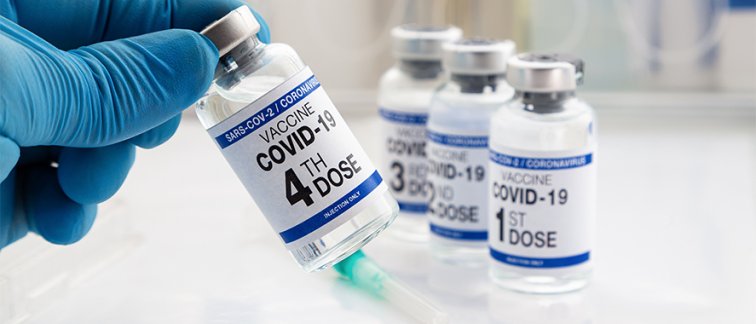A study conducted at five sites in the Netherlands including Amsterdam UMC revealed that a fourth mRNA COVID-19 vaccination can substantially improve the quantity of antibodies in patients with hematological malignancies, who are known to have impaired responses to COVID-19 vaccines. Despite the improvement, however, antibody concentrations remained lower than those in healthy individuals who had received three doses of the vaccine. The findings were published in eClinical Medicine.
Many people living with – or in remission from – blood cancer have a weakened immune system due to the malignancy itself or the treatments they received. As a consequence, these individuals are at higher risk of COVID-19-related morbidity and mortality, despite the introduction of COVID-19 vaccines.
Prior research showed that the primary two-dose mRNA vaccination schedule induced lower SARS-CoV-2 spike protein-specific antibody concentrations in patients with hematological malignancies compared to healthy individuals. A third vaccination was shown to enhance these concentrations significantly, leading to an improved virus neutralizing capacity per antibody.
For the current analysis, antibody concentrations of 414 patients with hematological diseases who received four mRNA vaccinations (3-dose primary series plus 1 booster vaccination) were compared to 58 healthy individuals who received the standard primary two-dose mRNA vaccination schedule followed by a first booster shot.
The findings revealed a significant rise in COVID-19 antibody concentrations in patients after the fourth dose, notably in those with recovering B cell compartments. However, concentrations still fell short compared to the healthy group. Interestingly, 19% of patients failed to produce antibodies despite receiving four vaccinations.
Patients who received the first two vaccinations while their B cells were depleted, and the next two during B cell recovery, demonstrated similar antibody induction dynamics to those with normal B cell counts during the first two shots. The patients’ antibodies, however, showed significantly better neutralizing capacity.
"This study provides essential insights into the effectiveness of continued vaccination in patients with B-cell depletion and persistent immunodeficiencies," said the lead researcher Prof. Mette Hazenberg, a hematologist at Cancer Center Amsterdam. "Our data suggest that the primary vaccination in the absence of B cells could prime the immune system, enhancing antibody maturity upon B cell recovery."
The researchers emphasized the need for vaccine effectiveness studies focused on patients at different stages of therapy to determine the impact of suboptimal antibody responses on COVID-19-related morbidity and mortality.
For more information, contact Prof. Mette Hazenberg, or read the scientific publication here:
Hofsink, Q., et al. (2023) Fourth mRNA COVID-19 vaccination in immunocompromised patients with haematological malignancies (COBRA KAI): a cohort study. eClinicalMedicine, 61, 102040. https://doi.org/10.1016/j.eclinm.2023.102040.
Funding
The research was funded by the Netherlands Organization for Health Research and Development (ZonMW) and Amsterdam UMC.
People involved at Amsterdam UMC
Quincy Hofsink
Sabine Haggenburg
Birgit I. Lissenberg-Witte
Michel S. Bhoekhan
Nienke J.E. Haverkate
Johan van Meerloo
Judith A. Burger
Joey H. Bouhuijs
Dorine Wouters
Ester M.M. van Leeuwen
Hetty J. Bontkes
Neeltje A. Kootstra
Kazimierz Groen
Marit J. van Gils
Abraham Goorhuis
Caroline E. Rutten
Mette D. Hazenberg
Inger S. Nijhof
Text by Laura Roy
This article was created fo Cancer Center Amsterdam.
© 2023 New Haven Biosciences Consulting – All rights reserved.

